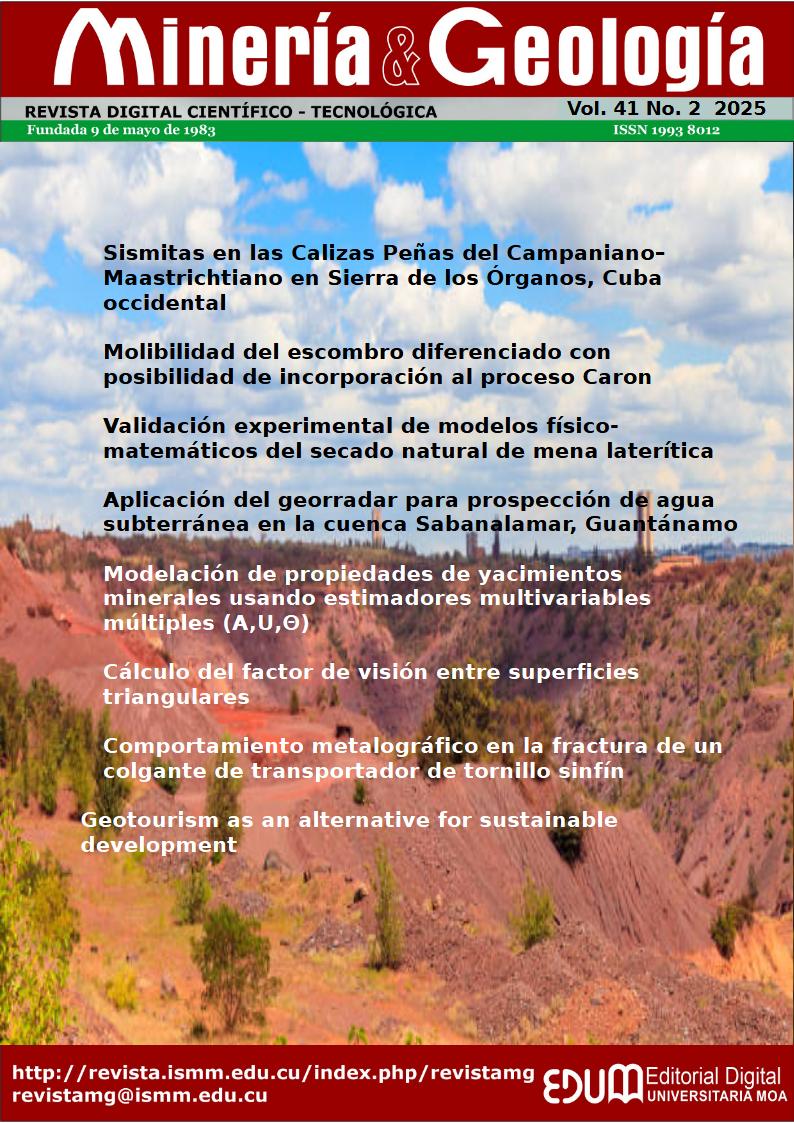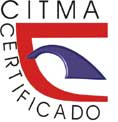Sismitas en las Calizas Peñas del Campaniano – Maastrichtiano en Sierra de los Órganos, Cuba occidental
Palabras clave:
Calizas Peñas, sismitas, eyecta, ChicxulubResumen
La unidad informal Calizas Peñas de edad Campaniano-Maastrichtiano aflora al SW del poblado de Pons, Sierra de los Órganos, en Cuba occidental. Está integrada por caliza de color gris oscuro a negro, bien estratificadas con intercalaciones de pedernal negro. Esta unidad subyace a la caliza laminada de la formación Ancón de edad Paleoceno temprano-Eoceno medio. El objetivo fue precisar las características petrográficas y micro-paleontológicas en las Calizas Peñas y su relación con el evento catastrófico de Chicxulub. Se trata de una micrita cretácica con textura de mudstones-wackestones recristalizado, en parte wackestones mudstones y wackestones brechado, en tanto la caliza laminada paleogénica es wackestones-packestones parcialmente brechado y wackestones con presencia de fósiles en un 30%-40%. Hay presencia de diferentes tipos de fracturas en la micrita cretácica, donde resaltan la laminación plegada, sistemas de microgrietas rectas, paralelas e inclinadas, grietas irregulares con espesores variables entre otros elementos. Estos rasgos corresponden a sismitas, relacionadas con el impacto de Chicxulub. El material eyéctico, de cuarzo de choque y esférulas, aunque escaso, apoya la idea anterior. En general, los resultados del estudio del afloramiento del río Peñas, le avalan como una nueva sección del límite K/Pg en ambiente de aguas profundas, situada en el occidente de Cuba y del Protocaribe, que abre nuevas perspectivas de investigación.Descargas
Citas
Alegret, L., Arenillas, I., Arz, J. A., Díaz, C., Grajales-Nishimura, M., Meléndez, A., Molina, E., Rojas, R. & Soria, A. R. (2005). Cretaceous-Paleogene boundary deposits at Loma Capiro: evidence for the Chicxulub impact. Geology, 33(9), 721-724.
Álvarez-Sánchez, H. & Bernal, L. R. (2013). Las formaciones Pons y Peñas del Cretácico de la Sierra de los Órganos. Instituto de Geología y Paleontología, La Habana, Cuba. 36 p. (Inédito).
Arenillas, I., Arz, J. A., Grajales-Nishimura, J. M., Murillo-Muñetón, G., Alvarez, W., Camargo-Zanoguera, A., Molina, E. & Rosales-Domínguez, C. (2006). Chicxulub impact event is Cretaceous/Paleogene boundary in age: new micropaleontological evidence. Earth and Planetary Science Letters, 249, 241-257.
Arenillas, I., Arz, J. A., Grajales-Nishimura, J. M. & Rojas-Consuegra, R. (2016). The Chicxulub impact is synchronous with the planktonic foraminifera mass extinction at the Cretaceous/Paleogene boundary: new evidence from the Moncada section, Cuba. Geological Acta, 14(1), 35-51.
Arz, J. A., Arenillas, I., Grajales-Nishimura, J. M., Liesa, C. L., Soria, A. R., Rojas, R., Calmus, T. & Gilabert, V. (2022). No evidence of multiple impact scenario across the Cretaceous/Paleogene boundary based on planktic foraminiferal biochronology. In: C. Koeberl, P. Claeys, & A. Montanari (Eds). From the Guajira Desert to the Apennines, and from Mediterranean Microplates to the Mexican Killer Asteroid: Honoring the Career of Walter Órganos. (Tesis de Diploma, Universidad de Pinar del Río). 60 p.
Banzo-Morales, S. (2024). Deformaciones frágiles en las Calizas Peñas, Sierra de los Órganos (Tesis de Diploma, Universidad de Pinar del Río). 60 p.
Banzo-Morales, S., Rojas-Consuegra, R., Cruz-Gámez, E. M., Pérez, W., Torres, M. & Griñán, I. B. (2025). Deformaciones frágiles en la Sierra de los Órganos. XI Convención de Ciencas de la Tierra. La Habana, Cuba, 7-11 abril. (Memoria digital). GEO 10-P7, 4 p. ISSN 2307-499X.
Bermúdez, H. D., Stinnesbeck, W., Bolívar, L., Rodríguez, J. V., García, J., Vega, F. J. (2015). Paleosismitas asociadas al límite K/Pg en la isla de Gorgonilla, pacífico colombiano. XV Congreso Colombiano de Geología. Bucaramanga, Colombia, 31 agosto-5 septiembre. (Memoria). 1 p.
Bermúdez, H. D., Bolivar, L., Martini, M., Vega, F. J., Arenillas, I., Arz, J. A., Gilabert, V., Phillips, G., Bermúdez, D., Garb, M., Vega-Sandoval, F., Rojas-Consuegra, R., Nuñez-Cambra, K. E., Berry, K., Korbar, T., Gómez, C. & Cui, Y. (2024). El Megaterremoto de Chicxulub: Evidencia en el registro geológico de Europa Occidental y las Américas. Geological Society of America Abstracts with Programs, 56(5). doi: 10.1130/abs/2024AM-401171.
Burkhard, M. (1993). Calcite twin, their geometry, appearance and significance as strain-stress markers and indicators of tectonic regime. A review. Journal of Structural Geology, 15(3–5), 351-368. doi.org/10.1016/0191-8141 (93)90132-T.
Busby, C. J., Grant, Y., Blikra, L. & Renne, P. (2002). Coastal landsliding and catastrophic sedimentation triggered by Cretaceous-Tertiary bolide impact. A Pacific margin example. Geological Society of America, 30(8), 687-690.
Denne, R., Scott, E., Eichkoff, D., Kaiser, J., Hill, R. & Spaw, J. (2013). Massive Cretaceous-Paleogene boundary deposit, deepwater Gulf of Mexico: New evidence for widespread Chicxulub-induced slope failure. Geology, 9, 983-986.
Dunham, R. J. (1962). Classification of carbonate rocks according to depositional textures. In: Classification of Carbonate Rocks — A Symposium by Ham. William, E. (ed), Tulsa, Oklahoma. American Association of Petroleum Geologists 108-121. ISBN 9781629812366.
Ferrill, D. A. (1991). Calcite twin widths and intensities as metamorphic indicators in natural low-temperature deformation of limestone. Journal of Structural Geology, 13, 667-675.
Goto, K., Tada, R., Tajika, E., Iturralde-Vinent, M. A., Matsui, T., Yamamoto, S., Nakano, Y., Oji, T., Kiyokawa, S., Garcia, D., Otero, C. & Rojas, R., (2008). Lateral lithological and compositional variations of the Cretaceous/Tertiary deep-sea tsunami deposit in northwestern Cuba. Cretaceous Research, 29(2), 217-236.
Groshong, R. H. Jr., Pfiffner O. A. & Pringle L. R. (1984). Strain partitioning in the Helvetic thrust belt of Eastern Switzerland from the leading edge of the internal zone. Journal of Structural Geology, 6, 5-18.
Kiyokawa, S., Tada, R., Iturralde-Vinent, M., Matsui, T., Tajika, K., Yamamoto, S., Oji, T., Nakano, T., Goto, K., Takayama, H., Garcia, D., Díaz, C. & Rojas., R. (2002). Cretaceous-Tertiary boundary sequence in the Cacarajicara Formation, western Cuba: An impact-related high-energy, gravity flow deposit. In: Koeberl, C., and MacLeon, K. G. (eds). Catastrophic events and mass extintions: Impacts and Beyond. Geological Society of America Special Paper 356, 125-144.
Klaus, A., Norris, R. D., Kroon, D. & Smit, J. (2000). Impact-induced mass wasting at the K-T boundary, Blake Nose, western North Atlantic. Geology, 28(4), 319–322.
Molina, E., Arenillas, J. I., Arz, J. A., Díaz-Otero, C., García-Delgado, D., Meléndez, A. & Rojas-Consuegra, R. (2002). Micropaleontología, cronoestratigrafía, y sedimentología del límite Cretácico/Terciario en el NO de Cuba. Geogaceta, 32, 287-290.
Montenat, C., Barrier, P. & Hibsch, C. (2007). Seismites: An Attempt at Critical Analysis and Classification. Sedimentary Geology, 196, 5-30. doi.org/10.1016/j.sedgeo.2006.08.004.
Obermeier, S. F. (1996). Use of liquefaction–induced features for paleoseismic analysis—An overview of how seismic liquefaction features can be distinguished from other features and how their regional distribution and properties of source sediment can be used to infer the location and strength of Holocene paleo–earthquakes. Engineering Geology, 44(1–4), 1–76. doi. org/10.1016/S0013-7952 (96)00040-3.
Pszczółkowski, A. (1987). Secuencias miogeosinclinales de la Cordillera de Guaniguanico: Litoestratigrafía, descripción de las facies y paleogeografía. Contribución a la geología de la provincia Pinar del Río. La Habana, Cuba: Científico-Técnica, 5-84.
Pszczółkowski, A. (1999). New data on the Lower Cretaceous microfossil and nannoconid stratigraphy in the Guaniguanico terrane of western Cuba. Studia Geolgica Polonica, 114, 7-33.
Renne, P., Arenillas, I., Vajda, V., Gilabert, V. & Bermúdez, H. D. (2018). Registro multiproxy del impacto de Chicxulub en el límite Cretácico-Paleógeno desde la isla Gorgonilla, Colombia. Geology, 46(6), 547–550.
Rojas-Consuegra, R. (2000). Taphonomic and Palaecolological observations in the Peñalver Formation, Western Cuba. Catastrophic Events and Mass Extintions: Impacts and Beyond. Viena, Austria, July 9-12. LPD Contribution, 1053, 183-184.
Rojas-Consuegra, R. & Núñez Cambra, K. (eds). (2017). Guía para la excursión al límite K-Pg en Cuba occidental. VII Convención de Ciencias de La Tierra. Excursiones post convención No 4. La Habana. CD ROM, 34 p. ISSN 2307-499X.
Rojas-Consuegra, R. & De Huelbes-Alonso, J. (2021). Supergrupo cronoestratigráfico del evento K-Pg (Daniano basal): una propuesta para el Léxico Estratigráfico de Cuba. IV Congreso de Geología, XIV Convención de Ciencias de La Tierra. La Habana, Cuba, 5 al 9 de abril (Memorias) 18p.
Schulte, P., Alegret, L., Arenillas, I., Arz, J. A., Bralower, T. J. & Christeson, G. L. (2010). El impacto del asteroide Chicxulub y la extinción masiva en el límite Cretácico-Paleógeno. Science, 327, 1214-1218. doi.org/10.1126/science.1177265.
Schulte, P., Deutsch, A., Salge, T., Berndt, J., Kontny, A., Macleod, K. G., Neuser, R. D. & Krumm, S. A. (2009). Chicxulub ejecta sequence with shocked carbonates from the Cretaceous– Paleogene (K-Pg) boundary, Demerara Rise, western Atlantic. Geochimica et Cosmochimica, 73(4), 1180-1204.
Schulte, T., Smit, J., Deutsch, A. & Salges, T. M. (2012). Tsunami backwash deposits with Chicxulub impact ejecta and dinosaur remains from the Cretaceous– Palaeogene boundary in the La Popa Basin, Mexico. Sedimentology, 59(3), 737–765.
Seilacher, A. (1969). Lechos clasificados por fallas interpretados como terremotos. Sedimentology, 13(1–2), 155–159.
Shoemaker, E. M., Wolfe, R. F. & Shoemaker, C. S. (1990). Asteroid and comet flux in the neighborhood of Earth. In: Sharpton, V. L. & Ward, P. D. (editors). Global catastrophes in Earth history: An interdisciplinary conference on impacts, volcanism, and mass mortality. Geological Society of America, Special Paper 247, 155–170.
Tada, R., Nakano, Y., Iturralde-Vinent, M. A., Yamamoto, S., Kamada, T., Tajika, E., Toyoda, K., Kiyokawa, S., Garcia Delgado, D., Oji, T., Goto, K., Takayama, H., Rojas, R. & Matsui, T. (2002). Complex tsunami waves suggested by the Cretaceous-Tertiary boundary deposit at the Moncada section, western Cuba. In Koeberl, C., and MacLeon, K.G. (eds) Catastrophic events and mass extintions: Impacts and Beyond: Boulder, Colorado. Geological Society of America, Special Paper 356: 109-123.
Tada, R., Iturralde-Vinent, M.A., Matsui, T., Tajika, E., Oji, T., Goto, K., Nakano, Y., Takayama, H., Yamamoto, S., Kiyokawa, S., Toyoda, K., Garcia-Delgado, D., Diaz-Otero, C. & Rojas-Consuegra, R. (2003). K/T boundary deposit in the paleo-western Caribbean basin. American Association of Petroleum Geologists Memoir, 79, 582-604.
Takayama, H., Tada, R., Matsui, T., Iturralde-Vinent, M. A., Oji, T., Tajika, E., Kiyokawa, S., Garcia, D., Okada, H., Hasagawa, T. & Toyoda, K. (2009). Origen of the Peñalver Formation in northwestern Cuba and its relation to K/T boundary impact event. Sedimentary Geology, 135, 295-320.
Publicado
Cómo citar
Número
Sección
Derechos de autor 2025 Bárbara Fuentes-Herrera

Esta obra está bajo una licencia internacional Creative Commons Atribución-NoComercial 4.0.
Los autores que publican en esta revista están de acuerdo con los siguientes términos:
- Licencia Creative Commons Atribución-NoComercial permite que el beneficiario de la licencia tenga el derecho de copiar, distribuir, exhibir y representar la obra y hacer obras derivadas para fines no comerciales siempre y cuando reconozca y cite la obra de la forma especificada por el autor o el licenciante.
- Los autores pueden establecer por separado acuerdos adicionales para la distribución no exclusiva de la versión de la obra publicada en la revista (por ejemplo, situarlo en un repositorio institucional o publicarlo en un libro), con un reconocimiento de su publicación inicial en esta revista.
- Se permite y se anima a los autores a difundir sus trabajos electrónicamente (por ejemplo, en repositorios institucionales o en su propio sitio web) antes y durante el proceso de envío, ya que puede dar lugar a intercambios productivos, así como a una citación más temprana y mayor de los trabajos publicados (Véase The Effect of Open Access) (en inglés).
- Lo anterior debe realizarse siempre sobre el artículo ya publicado por Minería y Geología.
La revista permite que los autores tengan los derechos de autor sin restricciones
La revista permite que los autores conserven los derechos de publicación sin restricciones










